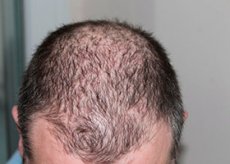Medical expert of the article
New publications
Diffuse alopecia (symptomatic): causes, symptoms, diagnosis, treatment
Last reviewed: 08.07.2025

All iLive content is medically reviewed or fact checked to ensure as much factual accuracy as possible.
We have strict sourcing guidelines and only link to reputable media sites, academic research institutions and, whenever possible, medically peer reviewed studies. Note that the numbers in parentheses ([1], [2], etc.) are clickable links to these studies.
If you feel that any of our content is inaccurate, out-of-date, or otherwise questionable, please select it and press Ctrl + Enter.

Daily hair loss (50-100) is a physiological process; the follicle re-enters the anagen phase and alopecia does not develop. However, under the influence of various external and internal factors, the asynchrony of hair cycles inherent in humans is disrupted and excessive hair loss occurs.
Diffuse alopecia can be one of the symptoms of endocrine diseases (hypo- and hyperthyroidism, decreased pituitary function, etc.), can occur as a reaction to taking medications (cytostatics, anticoagulants, D-penicillamine, antithyroid drugs, retinoids, antimalarial drugs, lithium carbonate, ibuprofen and many others), emotional and physical stress, exogenous and metabolic hypoproteinemia, contact with toxic substances (chloroprene, thallium, mercury, etc.), mineral deficiency, neoplasms, etc. A common reaction of follicles to negative effects is telogen effluvium, much rarer is anagen effluvium.
Telogen effluvium is the excessive loss of normal hair during the telogen phase. The most common of the six known functional types of this syndrome are:
- premature termination of the anagen phase such as: reaction to medication, fever, blood loss, starvation, etc.;
- late completion of the anagen phase; in the last trimester of pregnancy, hair follicles are delayed in the growth phase, and after childbirth) quickly enter the telogen phase. Hair loss when stopping taking contraceptives has a similar mechanism.
Anagen hair loss is excessive hair loss in the anagen phase, which is observed in patients with malignant neoplasms as a reaction to cytostatic and radiation therapy. It begins 4-10 days after exposure and can lead to total baldness. Sometimes the cause of anagen alopecia is poisoning with arsenic, thallium, pesticides. The action of these factors is based on the suppression of mitoses in matrix cells and disruption of cellular differentiation.
Treatment of diffuse alopecia
To treat poisoning (arsenic, mercury, iodine, bromine, etc.), specific antidotes (unithiol, sodium thiosulfate) or biologically active food supplements (BAFS) containing vitamins, macro- and microelements, and herbal extracts are used. BAFS remove toxic microelements and radionuclides from the body. The same drugs are used for individual correction of mineral imbalance. If hair loss is associated with taking medication, the doctor must decide on the possibility of replacing it. Patients also need psychological support, and some of them need help from a neuropsychiatrist. If psychotherapy is insufficiently effective, antidepressants are prescribed.
Forecast
The prognosis is favorable in cases where it is possible to establish and eliminate the cause of hair loss. It is usually easy to find out the cause of acute onset of alopecia. However, with its gradual development, even a thorough collection of anamnesis may be unproductive, since the patient is often unaware of the presence of concomitant diseases or intoxications. In such cases, an in-depth examination of the patient is necessary.


 [
[